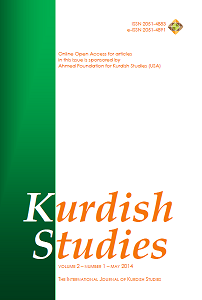Was Halabja a turning point for the poet Buland al-Haydari?
Was Halabja a turning point for the poet Buland al-Haydari?
Author(s): Hilla Peled-ShapiraSubject(s): Cultural history, Studies of Literature, Ethnic Minorities Studies
Published by: Transnational Press London
Keywords: Iraq; Halabja; Buland al-Haydari; Kurdish identity; poetry;
Summary/Abstract: This article examines the writings of the emigré Iraqi-Kurdish poet Buland al-Haydari (1926-1996) and thus explores components of his identity as reflected in themes and motifs of his poetry, in light of the fact that Iraqis belong to a variety of ethnicities, religions and sects. This article will also address the question of whether the poet's self-perception was transformed from a complex hybrid identity with Muslim, Christian, and other influences but excluding Kurdish elements, to a "new" Kurdish identity, as an outcome of the Iraqi chemical attack on the Kurdish town of Halabja in 1988. The assumption is that although the Halabja incident was the point at which the poet began to relate to his Kurdish origins, he was still loyal to Baghdad, to Iraq and to Arab culture, rather than solely emphasising his Kurdish identity. The article will examine the thematic and aesthetic effects of the tragedy in Halabja on al-Haydari's poetry in Arabic, focusing on different forms of identity as reflected in the poetry of this political activist.
Journal: Kurdish Studies
- Issue Year: 2/2014
- Issue No: 1
- Page Range: 14-33
- Page Count: 20
- Language: English

